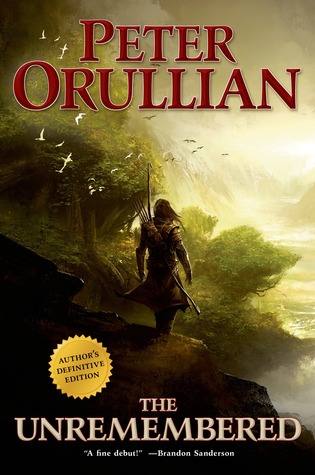
I was very happy to be given a chance to interview Peter Orullian about the authoritative edition of his novel, The Unremembered. The book—the first in the Vault of Heaven series—was action-packed, gripping, and a wonderful addition to the fantasy genre.
For more information on this anticipated series, please check out Mr. Orullian's website.
Q: This novel is very epic in scale and scope. The world contains depth, history, and a sense of realism. How much worldbuilding was needed for you to flesh out the past, present, and future of this world?
A: I did quite a bit of worldbuilding before I began to write. Of course, part of that was drawing a map. It sounds a little cliché, but there’s a real sense in which creating the geography can begin to help you conceptualize other elements of the world. And the map, itself, changes a lot during this phase.
I also put in place the creation mythology of the world, and much of its political and cultural structure. Beyond all that, I spent a lot of time on the magic systems.
But I also left a lot to the writing process. I know some writers architect everything in advance. Just as I know some who make it all up as they write. I fall about halfway between these. I build a good framework—something to work against—but I leave myself lots of canvas to paint as I go.
Q: We see a lot of heroes in the fantasy genre, but I don't think I've read one quite as flawed as Tahn. Yet, at the same time, he's very sympathetic in his thinking. The reader understands why he does what he does, even if they are the wrong decisions. How were you able to keep his character balanced between being realistically flawed, but still likable?
A: Much of the answer is in your question. If readers understand why a character is making the choices he or she makes, your character stands a better chance of remaining sympathetic, even when those decisions are wrong. Or heartbreaking. Unexplained heroism reads like Dudley Do-Right. Senseless villainy is just Snidely Whiplash. On the other hand, understanding a character’s motivation goes a long way to keeping a reader invested in the outcomes of that character’s choices.
And I think this is how most of us are in real life. We make bad decisions, but not because we’re bad people (most of us, anyway). Those decisions are informed by the experiences of our lives. In other words, we wind up being the sum of our choices. That sounds terribly high-minded. But my point is that two people in the same situation can make very different decisions. If we were privy to the formative experiences of those two people, both decisions could make sense.
I think fiction works the same way. And when those formative experiences are dire, tragic things, the sympathy for the character escalates. So, in Tahn’s case, his life has been hard, particularly in his youth. The reader is slowly learning why. This continues in book two. And because most of us have difficulties in our lives, and stumble, I think we’re able to better identify with characters who do the same.
Q: Since music seems to be important in your life, it makes sense that one of the magic systems in the series would be music based. Will we get to see more of the music in action as the series continues?
A: Absolutely. In The Unremembered you get just the first taste. In book two, Trial of Intentions, I turn the volume way up on the music magic. In fact, my character who possesses this ability goes to a place where she can train. She learns a lot about her gift and how to use it. And readers, likewise, get to see inside the music magic system, as she tests her ability in all kinds of battles.
I also start to reveal something I call “governing dynamics.” When I built my world, it made sense to me that all magic systems would have an underlying set of principles, much the way there are mechanical laws like gravity and magnetism.
The central principle upon which I frame all magic in my universe is called: Resonance. So far, I have five magic systems in my universe. And while each culture taps into Resonance (and related dynamics) in different ways, their magic systems are all built off the same principles. In some regards, it’s like quantum entanglement. But that’s a whole long different topic we can tackle another time.
In any case, the music magic system, which is one of the core systems, takes advantage of Resonance in some powerful ways. And in Trial of Intentions, I turn it up to eleven (that’s a Spinal Tap reference—sorry, couldn’t help myself).
Q: Mira's fear of having children is a sharp contrast to Wendra's maternal need to look after children. Is this due to their difference in race—and Mira's inability to actually raise the child—or is it more a difference in personality? Is there a statement to be made about the role of women, and mothers, within your world?
A: It’s really one of personality. The nature of Mira’s race—the Far—is that they die too young to every fully raise their own children. Many Far accept this well enough, given the promises they have in exchange for a shortened life. But Mira is hurt by the fact that she never got to know her birth mother. She doesn’t want that for any child she might have.
As for a statement on the role of women and/or mothers in my world, it’s not something I set out to do. I’ve no agenda. As I say, Mira’s feelings are personal. They’re formed out of her childhood experiences. They give context to choices she’s facing now, much the way we talked about making Tahn a realistic but flawed character.
Similarly, Wendra has had some traumatic experiences, as well. These experiences lend context to choices she makes.
But if I think about it, Mira and Wendra are both powerful women. One is a gifted fighter—crazy skilled. The other possesses an amazingly influential magic. These things define them as much as anything else. So, in the same way we were talking about Tahn above, for me, there are real-life corollaries. Women have differing feelings on the topic of motherhood—just as Mira and Wendra do. And those feelings are one aspect of who they are—just as Mira and Wendra each play a pivotal role in the overarching story of my series, bringing to bear their unique abilities to try and answer threats of war.
Q: Since this is the Author's Definitive Version, how does it differ from the previous version of the novel?
A: In several ways, actually. Without going into all the details as to why we’re doing an Author’s Definitive Edition, let me just say that writers and editors don’t always share the same vision for a book. For my part, I now have a different editor than I had when the original edition of The Unremembered was released.
As to how it’s different, first, it’s much shorter. I cut a lot. It’s uncommon for an Author’s Edition to be shorter. Usually the writer is adding words. And I did, too. But I started by trimming the book considerably. It helped pacing, among other things. Then, I took the opportunity to introduce some elements that would bring books one and two closer together. That wasn’t necessary, but I figured as long as I had the chance . . .
Working through the book, I brushed up dialogue here and there, removed exposition where I needed to, dropped in some Easter eggs, etc.
And then to the whole thing we’ve added epigraphs to each chapter, a glossary, an exclusive short story set in the universe—the POV character of which is a POV character in book two, and he’s inside the Bourne—and there are a few of the first chapters from Trial of Intentions, as well.
It’s not necessary to read the Author’s Edition of The Unremembered to transition into Trial of Intentions. If you’ve read the original, you’ll be just fine. And because of the editorial snafus prolonging the time between books one and two, I wrote Trial of Intentions as an entry point to the series. So, a reader could actually start the series with book two. All that said, if someone wants to start at the beginning, I recommend the Author’s Edition of The Unremembered. I think it’s a stronger book.
These next ones may contain spoilers, if that's all right.
Q: The theme of actions and consequences are visited several times in the novel. Yet, Tahn's blemishes are removed before Tallinghast—the negative consequences of his choices essentially erased. How will it affect him as he goes forward in the next book? Will that lightness still reside in him, making Mira continue to take in any stains he makes?
A: Well, like you noted above, Tahn’s a flawed character. Or, said another way, he makes the best choice he can at any given time based on who he is and what he knows. So . . . he’s not done making heartbreaking decisions.
But he and Mira won’t always be side-by-side. And he wouldn’t let her do for him again what she did near Tillinghast, anyway. In fact, early in book two, Tahn makes some very deliberate choices that fly in the face of what he “should” do. And he makes no apologies for it. Nor, if I’ve done my job, would anyone expect him to.
Q: Can you tell us if Penit did escape the Bar'dyn?
A: Nope. That’s one you’re going to have to read the next few books to find out.
Q: Were Sutter's visions of Mira a warning, or was it an unavoidable prophecy?
A: Well, Sutter sees the spirits of the dead before they die. But these aren’t prophecies. They’re not forgone conclusions. It’s kind of like the ghost of Christmas Future visiting Scrooge. Shadows of the future may be changed.
Q: Zephora and Mira have a few cryptic exchanges at Tillinghast. Mira speaks of a covenant with him—or with the Quiet—and Zephora calls her an "oathbreaker," which would mean that the Far were the ones who broke the covenant. Can you elaborate anymore on that and their relationship?
A: The gods who created the world left the Language of the Covenant for the people of Aeshau Vaal as a possible defense or weapon, should it ever be needed against the Quiet. The Covenant Tongue is insanely powerful. It’s the language that was used to frame the world.
The Far oath is to safeguard the Language of the Covenant until they reach the Age of Accountability—eighteen-years-old—which means they protect it during their years of stainlessness. The Far possess the godsgifts of exceptional speed and grace. In exchange for these gifts, and the promise that they will see their family in the next lift, the Far are able to defend and protect the Language of the Covenant without concern over the means whereby they do so. This is because they die before they can be held accountable for anything. Before they’re blemished or stained in any way by their choices.
But Mira takes on the stain of one of Tahn’s choices. So, she’s effectively no longer Far. She’s effectively broken her oath.
There is, though, a deeper connection between the people of the Bourne and the people of the Eastlands. But I’ll leave that to your discovery in the next books.
Q: Vendanj states several times that he brought others to Tillinghast before Tahn. What became of them? Is it only Tahn's relationship with the Will that saved him from the Draethmorte?
A: Yeah, this is an important point. Tahn isn’t so much the “chose one” as he is the “next one.” Tillinghast is a difficult place to survive. The Velle we first encounter in the book talks to Vendanj about this, suggesting that those Vendanj had taken to Tillinghast before had perished or failed. Clearly, there was a need for another one to go to Tillinghast, which is where we enter the story with Tahn and the others, on their way to that place. But that’s as much as I’ll say there.
As to your second question, about what helped Tahn survive Tillinghast and the Draethmorte, the Will is certainly part of it. But that’s not the whole of it, either. And again, I’ll pause before giving it all away . . .
I'd like to thank Mr. Orullian for answering my questions. It was an honor!
The Author's Definitive Edition of The Unremembered was rereleased on April 7. It can be purchased at Dragonmount's eBook store here. The second in the series— Trial of Intentions—will be available May 26, 2015, and can also be purchased here.












Recommended Comments
Join the conversation
You can post now and register later. If you have an account, sign in now to post with your account.
Note: Your post will require moderator approval before it will be visible.